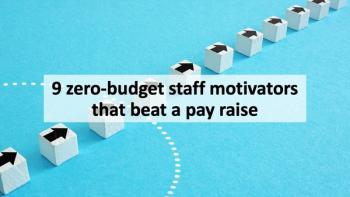
Four Unique Healthcare Apps
In a sea of healthcare apps, you sometimes have to stand out to make a difference. Here are four apps doing just that.
The last seven years has seen the rise of the smartphone and tablet as personal technology devices utilized by almost all professions in some capacity or another. The healthcare industry is no different and the veritable volume of applications or "apps" that have been developed and utilized by physicians and patients in the last few years has skyrocketed. Inevitably, the large volume of apps makes it difficult for individuals looking to make an impact to stand out in the crowd, as certain conventions become standard. Having a unique "hook" definitely helps to boost such apps into the spotlight, but it also serves to help physicians and patients look at new ways to utilize software (and the devices they run on).
CARROT Fit
Sometimes, "unconventional" is as simple as looking at something in a different or even humorous way. For example, CARROT Fit is an app developed by Brian Mueller that provides you with a sarcastic and merciless "fitness overlord" (modeled after his mother, sister, and wife) who motivates you through such innovative techniques as referring to you as "meatbag" and threatening you with "squirrel attacks" (yes, you read that right) when you fail to exercise. Mueller started out by writing alarm clock and to-do apps and received such a positive response about the personality of the Carrot A.I. (artificial intelligence) that a workout app seemed like the next logical step.
'"The CARROT series of apps are all about taking things that people hate doing … and making them fun and rewarding," said Mueller. "I think most people feel upset when they step on a scale … but CARROT's humor turns that around and makes it a positive experience they can laugh about - and because they connect with the character so much, they're actually motivated to do better the next day."
Bowel Mover Pro and Autism Tracker Pro
Another way to stand out in a field of "me too" health apps is to focus on areas of health that may be less common or more challenging to discuss. Case in point is developer Uwe Heiss. His company, Track & Share, developed Bowel Mover Pro and Autism Tracker Pro to empower patients with self-tracking tools that would make the patient-care team encounter more effective.
Any physician who has ever had to discuss bowel habits with an IBS patient knows how frustrating it can be to get vague feedback on patient symptoms. "All of my apps are designed to help people to spot trends, patterns, and how things might be related to each other," said Heiss. "For example, 'Does stress appear to aggravate my IBS symptoms?' 'Since I started Yoga, did my daily average stress level go down?' 'Was I able to avoid peak stress …?'"
Heiss stresses that three things which guided the design of his apps were the ability to highly customize what patients tracked, to provide powerful graphing options to identify patterns over time, and the ability to share data via external tools such as Excel, increasing the physician's ability to use the data in a meaningful way.
Symple
Developer Natasha Gajewski echoes some of these thoughts and developed her symptom-tracking app around one basic concept that also gave the app its name, "Symple." "I developed this app when I became a patient … one of my most important duties was to deliver an accurate symptom history between doctor visits," she said. "I had limited use of my hands and fingers … so I designed the touch interactions to be as simple as possible. We also worked hard to keep the cognitive load to a minimum."
One thing is certain. Regardless of the reason for defying convention, all developers believe the future of medicine will involve more integration of such apps and more active user interaction in an effort to enhance the patient-doctor encounter. At the end of the day, if visionaries succeed in this lofty endeavor, it will be because of the conventions they chose to modify or ignore in an effort to stand out and stand up for a better healthcare experience.
Saroj Misra, DO, is an osteopathic physician and clinical educator, working in Warren, Mich. He is also a member of the Physicians Practice Physician Advisory Board. What apps do you recommend to patients?Tell us at
Editor's Note: The writer has no financial interest in any of the companies or products mentioned. All software looked at was purchased by the author for the express purpose of developing this article. The author discloses no known conflicts of interest, financial, or otherwise.
This article originally appeared in the May 2015 issue of Physicians Practice.
Newsletter
Optimize your practice with the Physicians Practice newsletter, offering management pearls, leadership tips, and business strategies tailored for practice administrators and physicians of any specialty.




